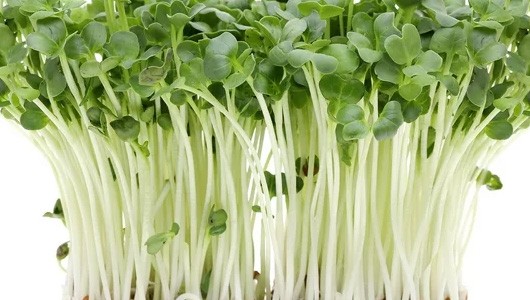-
 Turf Grass Seed Bluegrass, Bentgrass, Ryegrass, Fescues...
Turf Grass Seed Bluegrass, Bentgrass, Ryegrass, Fescues...
-
 Forage Seed Bromes, Clovers, Fescue, Wheatgrass, Legumes
Forage Seed Bromes, Clovers, Fescue, Wheatgrass, Legumes
-
 Grains Wheat Grain, Rye Grain
Grains Wheat Grain, Rye Grain
-
 Cover Crop Seed Buckwheat, Clover, Peas, Ryegrain
Cover Crop Seed Buckwheat, Clover, Peas, Ryegrain
-
 Wildflower Seed Mixtures, Singles, Annual, Perennial
Wildflower Seed Mixtures, Singles, Annual, Perennial
-
 Sprouting Seeds Fully certified Non-GMO Organic seeds for sprouts or microgreens
Sprouting Seeds Fully certified Non-GMO Organic seeds for sprouts or microgreens
Kaiware Daikon Radish Non-GMO Sprouting Seeds
Kaiware (Daikon) Radish seeds produce a tender, crisp sprout that tastes just like a radish. They grow quickly and can be used in salads, garnishes or as a flavor enhancer for food and/or dips and sauces.
Seeding Rate:
Indoor: 1oz p/10”x 20” tray
Outdoor: 8-10 lbs. per acre
How to Grow: Wash seeds thoroughly before planting. If grown indoors, germinate in darkness for at least two days (until germinated). Plant in fertile, well-drained soil at a depth of at least 1/8” with temperatures between 50°F to 75°F in full sun (or under grow lights). Keep the soil moist, but avoid overhead watering. Harvest when the seedlings are about 3-4” tall.
Cover Crop: Certain varieties of daikon can be grown as a winter cover crop. They are often named “tillage radish” because the plant grows a huge, penetrating root which effectively breaks up soil naturally and adds nutrients. If harsh winters occur, the root will decompose while in the soil, releasing early nitrogen stores in the spring. The roots can be stored for some weeks without the leaves if lifted and kept in a cool, dry area.
Nutritional Value: Sprouting seeds are richer in protein, folate, magnesium, phosphorus, manganese and vitamins C and K than un-sprouted plants. The vitamin and mineral content varies based on the variety of the sprouting seeds. Sprouts offer a powerful source of vitamins, minerals, antioxidants, and enzymes that fight free radicals because sprouting can increase their potency by 20 times or more.

